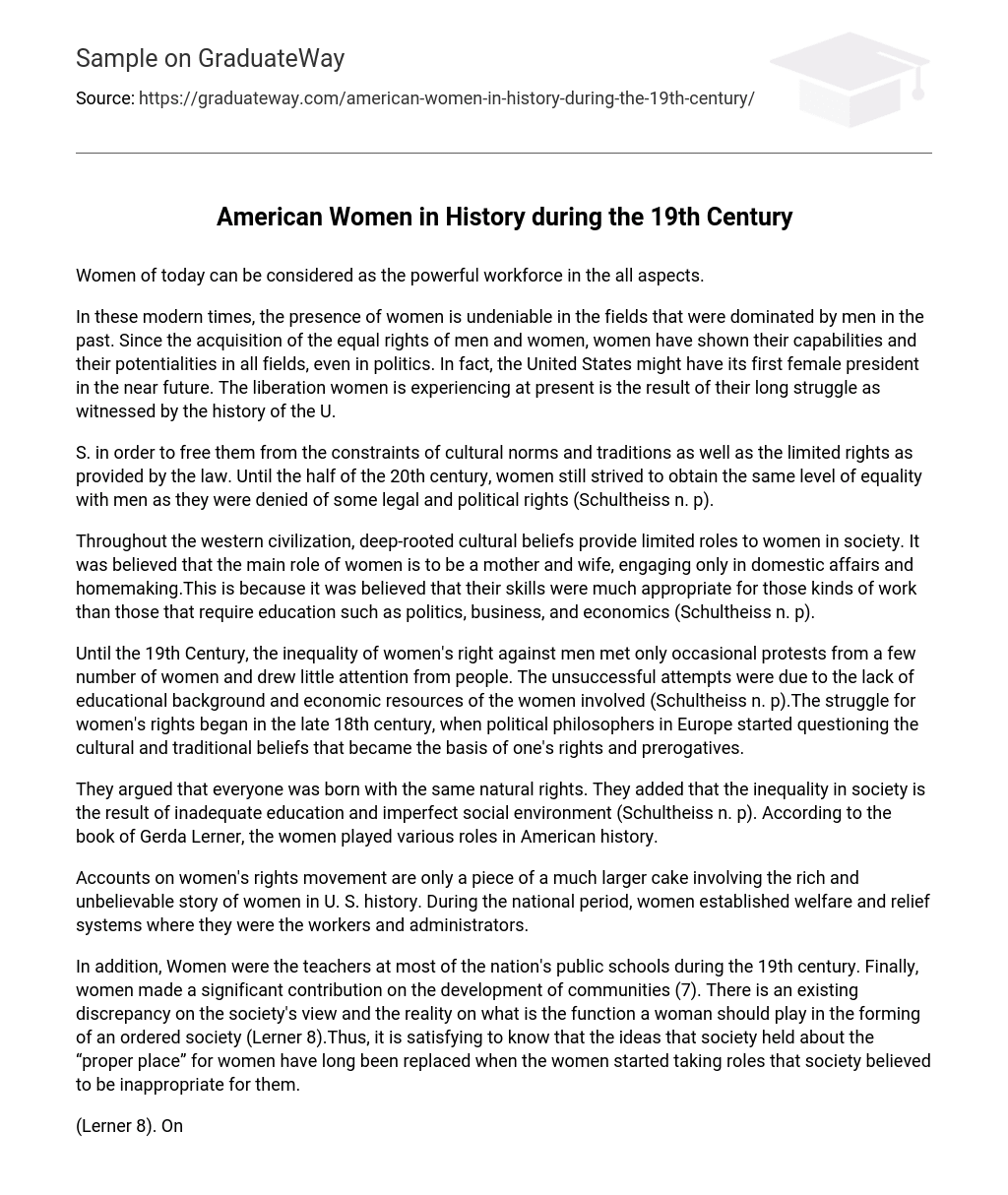Women of today can be considered as the powerful workforce in the all aspects.
In these modern times, the presence of women is undeniable in the fields that were dominated by men in the past. Since the acquisition of the equal rights of men and women, women have shown their capabilities and their potentialities in all fields, even in politics. In fact, the United States might have its first female president in the near future. The liberation women is experiencing at present is the result of their long struggle as witnessed by the history of the U.
S. in order to free them from the constraints of cultural norms and traditions as well as the limited rights as provided by the law. Until the half of the 20th century, women still strived to obtain the same level of equality with men as they were denied of some legal and political rights (Schultheiss n. p).
Throughout the western civilization, deep-rooted cultural beliefs provide limited roles to women in society. It was believed that the main role of women is to be a mother and wife, engaging only in domestic affairs and homemaking.This is because it was believed that their skills were much appropriate for those kinds of work than those that require education such as politics, business, and economics (Schultheiss n. p).
Until the 19th Century, the inequality of women’s right against men met only occasional protests from a few number of women and drew little attention from people. The unsuccessful attempts were due to the lack of educational background and economic resources of the women involved (Schultheiss n. p).The struggle for women’s rights began in the late 18th century, when political philosophers in Europe started questioning the cultural and traditional beliefs that became the basis of one’s rights and prerogatives.
They argued that everyone was born with the same natural rights. They added that the inequality in society is the result of inadequate education and imperfect social environment (Schultheiss n. p). According to the book of Gerda Lerner, the women played various roles in American history.
Accounts on women’s rights movement are only a piece of a much larger cake involving the rich and unbelievable story of women in U. S. history. During the national period, women established welfare and relief systems where they were the workers and administrators.
In addition, Women were the teachers at most of the nation’s public schools during the 19th century. Finally, women made a significant contribution on the development of communities (7). There is an existing discrepancy on the society’s view and the reality on what is the function a woman should play in the forming of an ordered society (Lerner 8).Thus, it is satisfying to know that the ideas that society held about the “proper place” for women have long been replaced when the women started taking roles that society believed to be inappropriate for them.
(Lerner 8). One of the main struggles women faced during the 19th century that became the trademark of women’s rights is the struggle for suffrage. Women suffrage is the right of women to have equal rights as men, particularly in the right to vote and to hold the public office. The women suffrage movement originated from America during the 19th century, a time when the civil law did not recognize the equality of the two sexes.
The basis for this provision was the belief that women cannot reason as soundly as men. As a result, the law deprived the women of the right to vote. The first phase of this notable struggle consisted merely of protests and petitions made by the suffragists before the law making body (Banner n. p).
The American suffragist’s victory was obtained shortly after World War I. In 1919, the Congress approved the 19th Amendment to the U. S. Constitution, which states that “The right of citizens of the United States to vote shall not be denied or abridged by the United States or by any State on account of sex.
This provision was ratified on August 18, 1920 and formally became a prevailing law of the land (Banner n. p).The women truly played a great deal of role in the national history of the United States by disproving the cultural beliefs of their traditional and stereotypical role as homemakers and domestic providers incapable of participating in decision-making. Although they are still proving their worth for the equality they battled for over two centuries now, the fact that women gained rights equal to men has tremendously changed the American laws, traditions, beliefs, and culture which greatly contributed to the nation’s progress.





